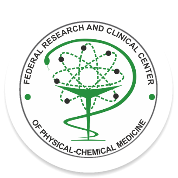According to the Statute, the activities of the institute are aimed at introducing into medical practice new medications and methods for diagnostics, prevention, and treatment of human diseases, through investigation of the physical-chemical bases of pathogenesis.
SRI PCM carries out research including:
- investigation of physical-chemical bases of socially significant human diseases;
- development and introduction of new diagnostic methods based on novel data on physicochemical mechanisms underlying human diseases;
- development and introduction of new treatment modalities aimed at the restoring the body’s internal milieu.
The institute is engaged in developing innovative methods for diagnosis and treatment such as genetic diagnostics and gene therapy.
The institute conducts research to estimate the genetic contribution to the incidence of cardiovascular and oncological diseases, and to build a database on the frequency of clinically relevant genetic polymorphisms in the Russian population.
One particular goal is to develop an optimized laboratory protocol for isolation, culture, cell typing, and evaluation of malignant transformation capability of mesenchymal stem cells, for the purpose of assessing their role in the regeneration of injured tissue and organ structures and function.
Another topic of our research is to study the contribution of genetic mechanisms to the emergence of antibiotic-resistant strains of bacteria causing hospital-acquired and chronic infections, such as gonococcus, pneumococcus, and Mycobacterium tuberculosis.
A research is being carried out to develop new fluorescent methods for detecting changes in plasma protein content and conformation during a pathological process.
Studies on the role of oxidative stress in ischemic heart disease are called to help diagnose at early stages the development of disease complications.
One of our institute’s research lines is the development of a glucose-selective holographic sensor based on hydrogel matrices, a device suitable for rapid diagnostics of diabetes and glucose monitoring.
The institute conducts research aimed at developing an antithrombotic agent containing an active ingredient capable of suppressing the activity of platelets, the effectors of arterial thrombosis.
One of the institute’s activities is experimental and clinical trials of domestic enterosorbents.
The first Russian Acute Coronary Syndrome Registry launched by our institute will provide a real-world view of clinical practice, and favor the development of treatment recommendations and standard treatment guidelines.
The organizational structure of SRI PCM includes the following departments:

